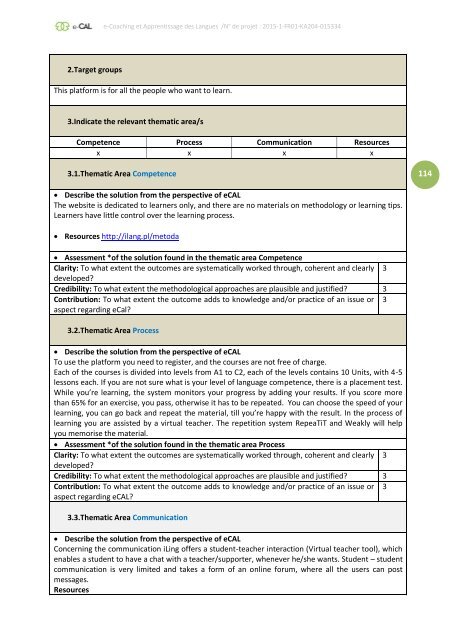e-CAL - e-Coaching et Apprentissage des Langues
The ERASMUS+ project e-CAL presents the result of an analysis of support methods in the case of language learning using web-based Open Educational Resources (OER).
The ERASMUS+ project e-CAL presents the result of an analysis of support methods in the case of language learning using web-based Open Educational Resources (OER).
You also want an ePaper? Increase the reach of your titles
YUMPU automatically turns print PDFs into web optimized ePapers that Google loves.
e-<strong>Coaching</strong> <strong>et</strong> <strong>Apprentissage</strong> <strong>des</strong> <strong>Langues</strong> /N° de proj<strong>et</strong> : 2015-1-FR01-KA204-015334<br />
2.Targ<strong>et</strong> groups<br />
This platform is for all the people who want to learn.<br />
3.Indicate the relevant thematic area/s<br />
Comp<strong>et</strong>ence Process Communication Resources<br />
x x x x<br />
3.1.Thematic Area Comp<strong>et</strong>ence<br />
114<br />
Describe the solution from the perspective of e<strong>CAL</strong><br />
The website is dedicated to learners only, and there are no materials on m<strong>et</strong>hodology or learning tips.<br />
Learners have little control over the learning process.<br />
Resources http://ilang.pl/m<strong>et</strong>oda<br />
Assessment *of the solution found in the thematic area Comp<strong>et</strong>ence<br />
Clarity: To what extent the outcomes are systematically worked through, coherent and clearly 3<br />
developed?<br />
Credibility: To what extent the m<strong>et</strong>hodological approaches are plausible and justified? 3<br />
Contribution: To what extent the outcome adds to knowledge and/or practice of an issue or 3<br />
aspect regarding eCal?<br />
3.2.Thematic Area Process<br />
Describe the solution from the perspective of e<strong>CAL</strong><br />
To use the platform you need to register, and the courses are not free of charge.<br />
Each of the courses is divided into levels from A1 to C2, each of the levels contains 10 Units, with 4-5<br />
lessons each. If you are not sure what is your level of language comp<strong>et</strong>ence, there is a placement test.<br />
While you’re learning, the system monitors your progress by adding your results. If you score more<br />
than 65% for an exercise, you pass, otherwise it has to be repeated. You can choose the speed of your<br />
learning, you can go back and repeat the material, till you’re happy with the result. In the process of<br />
learning you are assisted by a virtual teacher. The rep<strong>et</strong>ition system RepeaTiT and Weakly will help<br />
you memorise the material.<br />
Assessment *of the solution found in the thematic area Process<br />
Clarity: To what extent the outcomes are systematically worked through, coherent and clearly 3<br />
developed?<br />
Credibility: To what extent the m<strong>et</strong>hodological approaches are plausible and justified? 3<br />
Contribution: To what extent the outcome adds to knowledge and/or practice of an issue or 3<br />
aspect regarding e<strong>CAL</strong>?<br />
3.3.Thematic Area Communication<br />
Describe the solution from the perspective of e<strong>CAL</strong><br />
Concerning the communication iLing offers a student-teacher interaction (Virtual teacher tool), which<br />
enables a student to have a chat with a teacher/supporter, whenever he/she wants. Student – student<br />
communication is very limited and takes a form of an online forum, where all the users can post<br />
messages.<br />
Resources


